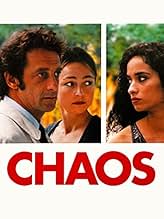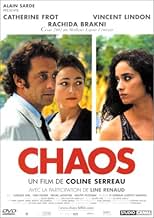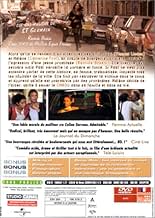Chaos
- 2001
- 1 घं 49 मि
अपनी भाषा में प्लॉट जोड़ेंOne night by accident, a young prostitute barges into the lives of a bourgeois, modern-but-conventional couple. Hounded down, beaten up, threatened, she will continue to struggle, with the h... सभी पढ़ेंOne night by accident, a young prostitute barges into the lives of a bourgeois, modern-but-conventional couple. Hounded down, beaten up, threatened, she will continue to struggle, with the help of a well-off lady, first for her survival--her resurrection--then for her dignity and... सभी पढ़ेंOne night by accident, a young prostitute barges into the lives of a bourgeois, modern-but-conventional couple. Hounded down, beaten up, threatened, she will continue to struggle, with the help of a well-off lady, first for her survival--her resurrection--then for her dignity and freedom. Stormy encounters are forecast for everyone involved.
- पुरस्कार
- 4 जीत और कुल 4 नामांकन
- Pali
- (as Wojtek Pszoniak)
फ़ीचर्ड समीक्षाएं
Helene feels responsible for this stranger, whom she comes to know as Noemie, and spends much time with her at the hospital. But when she discovers that Noemie's life may be in danger, Helene sneaks her out of the hospital posing as a nurse.
Taking her to her mother-in-law's country home to recover, she learns of Noemie's tragic story. Brought to France from Algeria by her father, she chooses a life of prostitution after her dad sold her down the river to an Algerian man.
This movie tells me how prostitution works in France and its similarities in the prostitution that's been happening in our country.
This is a funny and fast-paced movie. I would have enjoyed it more if I can only understand the French language.
The film is no lightweight fare. It's a heartfelt reflection on women's place in society in similar situation/environment as the four women depicted in "Chaos" - and there's hope for tenacious bonding relationships to blossom and grown. The ending sight is serene and peaceful to behold, full of heart.
There are social commentaries sprinkled through out the film, be it obvious or subtle. Following the two women made us care about what will happen next: how will Hélène get pass/deal with the hoodlums, will Malika wake up, how can she fight the thugs in a wheelchair, is Paul really such a wimp and a jerk, do we treat our mothers like that - such observant perceptions Serreau included.
With the war situation, we are more aware of the fragility of life and how death can occur without warning. Like Yin & Yang, life & death are inseparable forces. What happens brought the two together, changing each other's course of life. 'tis death to the 'former' way of life and began anew their ventures, helping each other to attain the 'peace' they somehow individually needed. Esoteric this may sound, the dramatic plot of "Chaos" is entertaining assured.
The hospital bedside scene reminded me of Erick Zonca's "The Dreamlife of Angels" aka "La Vie rêvée des anges" 1998 - another worthwhile dramatic French film. Both films are available on DVD.
Colin Serreau wrote and directed "Three Men and A Cradle" in 1985 aka "Trois hommes et un couffin" with U.S. remake as "Three Men and A Baby" in 1987.
Case in point is the film, `Chaos', by Coline Serreau, who presents a fairy tail story that celebrates, glorifies and idolizes the strength and perseverance of women in a male-dominated society. The main plot revolves around two women: Helene, an upper-middle class French woman, and Malika, a young prostitute. The two meet when Helene and her husband accidentally encounter Malika being violently attacked by a group of men. The couple witness this from inside their car, but the husband doesn't want to help or have anything to do with the girl, who's been left for dead. Helene, overwhelmed with guilt, decides to visits Malika in the hospital, against her husband's strict instructions. As Malika slowly regains consciousness, and her physical strength returns, the women grow closer, and the story behind the mysterious heroine unfolds. And, like a blooming flower, so does the magnitude of the story line, which becomes far too complicated to summarize here. (It's also far more involved than it needed to be for the plot or social commentary.)
Suffice to say, the story is all about Malika's and all the female characters' struggles to find individuality and freedom from under the thumb of the men in their lives. But the film doesn't stop there - it also makes observations (and hence, commentary) about French society, Muslim cultures, and a variety of other aspects of modern life. Attempting to serve all these objectives, the film tends to meander from one character to another, and one political statement to another, so it can squeeze it all in. This ends up overcomplicating things to a minor degree, but in the end, the movie is really all about women and their plight, and the movie makes no excuses or apologies about that.
For Helene, it's as simple as her leaving her good-for-nothing, ego-centric husband. For Malika, though, her first barrier is her patriarchic Muslim family, who stymied her attempts to educate herself or make a better life. Then it's her father, who tried to sell her to a man in Algeria for marriage. When she ran away just before her scheduled departure, she found herself under the influence of a pimp, who forced her into prostitution, drugged and raped her, and beat her relentlessly, over and over. Things get worse and worse for all the women in the film, major and minor characters alike, until things come to a head, when (surprise) all women come together and win, and all the men lose in a big, big way.
The film's use of satire is exaggeration and extremes, but you don't necessarily see that in one character alone, but all the characters as a collective. All the men are evil, and all the women are glorified. This use of two-dimensional character portrayal gives away the otherwise obvious moral agenda of the film; it also draws attention to the unsophisticated satirical vehicles normally employed by much less experienced filmmakers. It's almost as though Serreau gets so lost in her own agenda that she forgets the true nature of cutting satire. When events develop so transparently and obviously, you can't help but know that this film is only trying to preach to the converted.
Effective satire is about making acute and keen observations of real people, subtly leading us to the filmmaker's desired conclusions, all the while letting us think we got there on our own. We need to see at least one of the heroines lose because the sad reality is that not all women leave the men that subjugate them--we need to be reminded of that not just for the dose of reality for credibility's sake, but it accentuates the emotional impact of the victories of the women that do overcome their barriers. Similarly, one of the bad guys should be portrayed as changing his ways so as to draw more attention to those who don't. Serreau's problem is that she can't accept a character losing. This, in itself, compromises credibility. As Shakespeare once said, `thou doest protest too loudly.'
There's no question that `Chaos' will win the hearts and minds of women who feel victimized, or who seek the camaraderie of seeing strong women win on screen. But it's almost sad to see them rally around what is essentially a vacuous film that doesn't carry the more cogent message it could have been so much more effective at giving. I guess it's my way of saying, `preaching to the converted isn't hard. Leave that to the amateurs.'
क्या आपको पता है
- ट्रिवियाVisa d'exploitation en France #90446.
टॉप पसंद
विवरण
बॉक्स ऑफ़िस
- बजट
- FRF 4,80,00,000(अनुमानित)
- US और कनाडा में सकल
- $2,06,789
- US और कनाडा में पहले सप्ताह में कुल कमाई
- $20,570
- 2 फ़र॰ 2003
- दुनिया भर में सकल
- $64,77,370
- चलने की अवधि1 घंटा 49 मिनट
- रंग
- ध्वनि मिश्रण
- पक्ष अनुपात
- 1.66 : 1
इस पेज में योगदान दें
































